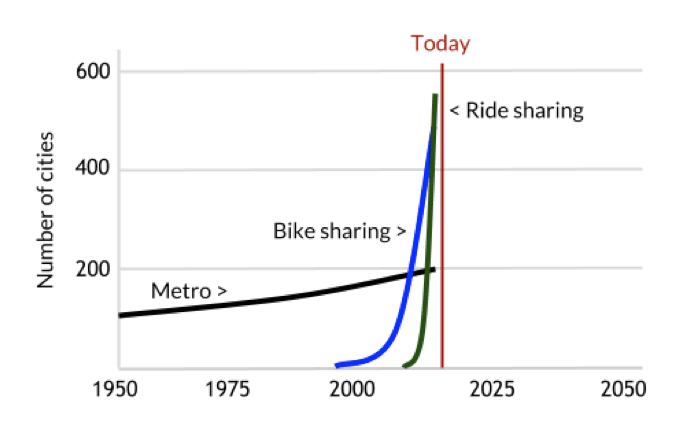
Urban tech startups and the cities of the future
Courtesy Smart City Startups.
Shaun Abrahamson is CEO and co-founder of Urban.Us, an investment fund investing in startups that make cities better. He also produces Smart City Startups, an annual event that focuses on people and organizations transforming our cities in the next decade that will next take place April 23-24, 2015 in Miami. Knight Foundation supports the event.

People are moving to cities at unprecedented rates. The chart below forecasts the growth of our urban population and the targets for reducing greenhouse gas emissions that cause climate change (targets set by the European Union). Since cities currently account for about 75 percent of greenhouse gas emissions, if we cannot change how we build and operate them we have little hope of achieving our climate goals. Cities must be smart if they are to serve the needs of more people while shrinking emissions. Smart City Startups is a showcase for technology and ideas that get us closer to that goal.

Graphic credit Urban.Us
What is a smart city?
Smart city has come to mean something quite specific: technology that is sold to local government agencies to enable them to better deliver services. But we’ve noticed that many companies having impact on cities are selling to businesses and consumers. Startups such as Uber, Waze and Nest are less than a decade old, but they are dramatically reshaping how we move around and reduce our energy consumption and footprint. RELATED LINKS
“Smart City Startup conference brings construction drones, hoverboards and talking homes to Maimi, showcasing ideas that transform cities” – press release, 03/30/15
Over the last 18 months we’ve researched hundreds of startups and created a radar plot of their solutions—who they sell to and what city problems they solve. We’re seeing a rapid increase in founders and investors who want to solve city problems and believe startups are poised to solve many of our biggest city challenges.
Direct energy solutions
It’s very common to see startups working directly on demand-side energy problems. How do we make more efficient buildings? Take Radiator Labs’ Cozy, the retrofit radiator cover, allowing you to control room temperature by using sensors to trap and release heat.
A single Cozy may be a matter of comfort, but when a whole building is hooked up, this data can be used to determine when to reduce the heat thereby reducing fuel use by 40 percent. Imagine the impact on over 120 million radiators nationwide.
Similarly, Flair Vents allow homeowners to control airflow using sensors to different rooms through an app. Imagine how many hotel rooms in South Florida are being cooled at the same temperature, whether the room is occupied or not, and how much energy could be saved using Flair in a fraction of these hotels. Startups such as these have the potential to dramatically reduce the carbon footprint of our cities today and in the future.
Attendees will have the opportunity to see, touch and demo efficiency technologies such as MeterHero, Rach.io, Lagoon and Zuli along with 10 others featured in Direct Energy’s smart mobile exhibit.
Indirect energy solutions
Mobility has been hot. Urbanization and connectivity have made it possible to adopt car-sharing, bike-sharing and new personal mobility devices, not to mention pop-up mass transit and crowd fueled transit apps. According to Frost & Sullivan, car-sharing memberships are forecasted to exponentially grow to around 26 million by 2020.

Graphic credit Urban.Us. Data credit Urban.Us /EMBARQ
We’re rethinking how we move people and things around cities. Convenience or better economics may be the incentive, but the outcome is fewer cars on the roads resulting in lower emissions. This is critical, since mobility is one of the biggest contributing factors to climate change in cities. For example, Zipcar estimates that each Zipcar helps eliminate the need for up to 15 personally owned vehicles and its members have reduced collective emissions by more than 1.4 billion pounds of CO2 in just the past year.
Startups building innovative personal mobility solutions such as OneWheel, Whill, DASH, Vinli, Placemeter, ValetAnywhere, Bandwagon, Transitmix and more will be showcasing their work.
Mobility vs. location, location, location
One of the most exciting discussions will be, “Disrupting Location: How Mobility Startups Reshape Our Cities,” led by moderator Aimee Rawlins, startup and innovation editor for CNNMoney, and featuring Anand Shah, Venture Development at BMW Impact Ventures; Kyle Doerkersen, founder and inventor of OneWheel; Tiffany Chu, co-founder and chief design officer of Transitmix; and Chris Thomas, founder and partner of Fontinalis Partners.
Location is critical when choosing where to live and work. How do you get to work? A few years ago you might have asked: Do I need to drive? Is there affordable convenient parking? How accessible is public transit? Now you might ask: Are Uber, Lyft, Zipcar or Car2go available? What about pop-up mass transit options? You might even ask: Can I Onewheel it?
These factors impact where you live. We’ll discuss recent changes to mobility options and what to expect in the coming years. The explosion of choices means the value of location and its impact on real estate value and development may be quite different in the coming years.
We’re anxious to see a lot more innovation from startups because as Anthony Townsend, author of “Smart Cities: Big Data, Civic Hackers and the Quest for a New Utopia, writes, “The coming century of urbanization is humanity’s last attempt to have our cake and eat it too, to double down on industrialization, by redesigning the operating system of the last century to cope with the challenges of the coming one.”
Recent Content
-
Communitiesarticle ·
-
Communitiesarticle ·
-
Communitiesarticle ·


